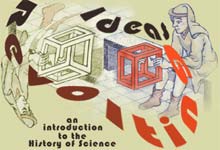
University of California, Irvine
Instructor: Dr. Barbara J. Becker

|
|
Newton's Optical Studies |
|
|
1664: No color will result from a mixture of pure black and white. If that happened, then pictures drawn with ink would appear colored, printed pages would appear colored at a distance, and the edges of shadows would be colored. Therefore, colors cannot arise from the reflection of light or of shadows mixed with light. See if two prisms--one casting blue upon the other's red--do not make a white. The rays which make blue are refracted more than the rays which make red. This can be seen in the following experiment: On a black peice of paper I drew a line opq, whereof one halfe op was a good blew ye other pq a good deepe red (chosen by Prob of Colours). And looking on it through ye Prisme adf, it appeared broken in two betwixt ye colours, as at rst, ye blew parte rs being nearer ye vertex ab of ye Prisme yn ye red parte st. Soe yt blew rays suffer a greater refraction yn red ones. Note [I call those blew or red rays &tc. wch make ye Phantome of such colours. The same experiment may bee tryed wth a thred of two colours held against ye darke. 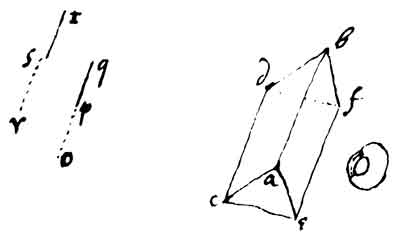
|
|
1665: Prismatical colors appear in the eye in the opposite order to that which they fall on the paper. If the sun shines on a prism, some of the rays are refracted through the prism and make colors on the wall, while other rays are reflected out another side of the prism. The reflected rays are only white and show no colors. If you turn the prism, so that the colorful rays leave the prism at a sharper and sharper angle, the blue color will suddenly vanish from the colorful array on the wall and will, instead, join with the reflected rays. The reflected rays will now appear a little bluish. If you turn the prism even more, the red color will vanish too from the colorful array, and join the reflected rays, making the bluish color turn white again.
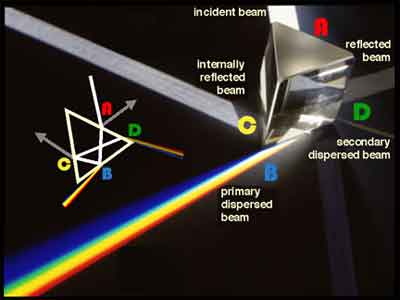
If three or more prisms (A, B, and C) are held in the sun so that the red color of prism B falls upon the green or yellow color of prism A, and the red color of prism C falls on the green or yellow color of prism B, then when that colored light that falls on a paper screen it will appear red at one end and blue at the other, but in between, where all the colors of the different prisms are blended together, it will appear white.
Thin flakes of mica, bubbles which children make of soap and water, water wiped very thin on glass, glass blown very thin, etc exhibit the phenomena of the colored circles. | |
1672:
|
|
|
Title page of Opticks (1704) by Isaac Newton |
Sir Isaac Newton himself notwithstanding the great advantage
which he derived from patient thinking, indulged bold and eccentric thoughts
of which his Queries at the end of his book of Optics are a sufficient
evidence.
--Joseph Priestley |
The Queries |
|
When I made the foregoing Observations, I design'd to repeat most of them with more care and exactness, and to make some new ones for determining the manner how the Rays of Light are bent in their passage by Bodies, for making the Fringes of Colours with the dark lines between them. But I was then interrupted, and cannot now think of taking these things into farther Consideration. And since I have not finish'd this part of my Design, I shall conclude with proposing only some Queries, in order to a farther search to be made by others. Query 1
Query 2
Query 5
Query 8
Query 13
Query 26
Query 27
Query 28
Query 29
Query 30
Query
31
|
According to Newton, Reason is immutable and universal--
|
|
|
| ...The inmost places of the heavens, now gained, Break into view, nor longer hidden is The force that turns the farthest orb. The sun Exalted on his throne bids all things tend Toward him by inclination and descent, Nor suffers that the courses of the stars Straight, as through the boundless void they move, But with himself as centre speeds them on In motionless ellipses. Now we know The sharply veering ways of comets, once A source of dread, nor longer do we quail Beneath appearances of bearded stars. ...... Then ye who now on heavenly nectar fare,
Preface to Principia (1687) |
| I have first considered mankind; and the result of
my thoughts has been, that amidst such an infinite diversity of laws and
manners, they were not solely conducted by the caprice of fancy.
I have laid down the first principles, and have found that the particular cases follow naturally from them; that the histories of all nations are only consequences of them; and that every particular law is connected with another law, or depends on some other of a more general extent.... I have not drawn my principles from my prejudices, but from the nature
of things.
--Charles Montesquieu (1689-1755)
|
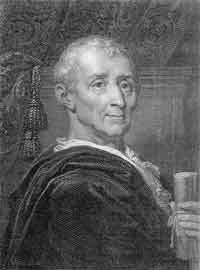
|
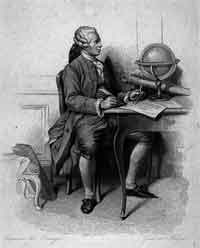
|
Our century is called ... the century of philosophy
par excellence...
The discovery and application of a new method of philosophizing, the
kind of enthusiasm which accompanies discoveries, a certain exaltation
of ideas which the spectacle of the universe produces in us--all these causes
have brought about a lively fermentation of minds, spreading through nature
in all directions like a river which has burst its dams.
--Jean Lerond d'Alembert (1717-1783)
|
| The most ancient of all societies, and the only one
that is natural, is the family: and even so the children remain attached
to the father only so long as they need him for their preservation.
As soon as this need ceases, the natural bond is dissolved....
This common liberty results from the nature of man. His first law is to provide for his own preservation, his first cares are those which he owes to himself; and, as soon as he reaches years of discretion, he is the sole judge of the proper means of preserving himself, and consequently becomes his own master. |
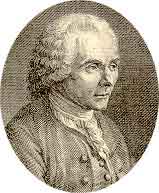
--Jean-Jacques Rousseau (1712-1778)
|
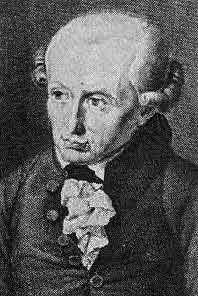
--Immanuel Kant (1724-1804)
|
Dare to know! "Have the courage to use your
own reason!"--THAT is the motto of the enlightenment.
Laziness and cowardice are the reasons why such a large part of mankind gladly remain minors all their lives, long after nature has freed them from external guidance. They are the reasons why it is so easy for others to set themselves up as guardians. It is so comfortable to be a minor. If I have a book that thinks for me, a pastor who acts as my conscience, a physician who prescribes my diet, and so on--then I have no need to exert myself. I have no need to think, if only I can pay; others will take care of that disagreeable business for me.... This enlightenment requires nothing but freedom ... to make public use of one's reason in all matters.... When we ask, Are we now living in an enlightened age? the answer is, No, but we live in an age of enlightenment. |
|
|
David Gregory (1659-1708) |
|
John Keill (1671-1721) |
|
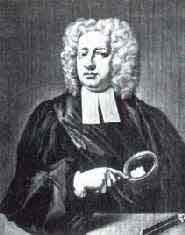
John Desaguliers (1683-1744) |
|
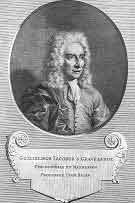
Willem s'Gravesande (1688-1742) |
|
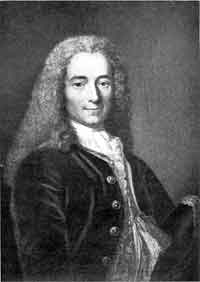
Voltaire (1694-1778) |
This famous Newton, this destroyer of the Cartesian system, died in March, anno 1727. His countrymen honoured him in his lifetime, and interred him as though he had been a king who had made his people happy....
Sir Isaac Newton has demonstrated to the eye, by the bare assistance of the prism, that light is a composition of coloured rays, which, being united, form white colour. A single ray is by him divided into seven, which all fall upon a piece of linen, or a sheet of white paper, in their order, one above the other, and at unequal distances. The first is red, the second orange, the third yellow, the fourth green, the fifth blue, the sixth indigo, the seventh a violet-purple. Each of these rays, transmitted afterwards by a hundred other prisms, will never change the colour it bears; in like manner, as gold, when completely purged from its dross, will never change afterwards in the crucible. As a superabundant proof that each of these elementary rays has inherently in itself that which forms its colour to the eye, take a small piece of yellow wood, for instance, and set it in the ray of a red colour; this wood will instantly be tinged red. But set it in the ray of a green colour, it assumes a green colour, and so of all the rest.
|
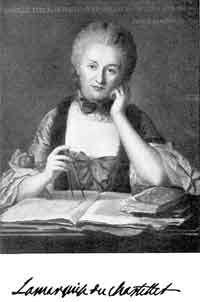
Émilie du Châtelet (1706-1749) |
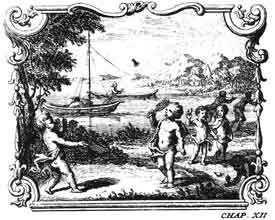
Putti [angelic children] play badminton in an illustration of the laws of physics at work in everyday activities, from Émilie du Châtelet's Institutions Physiques. |
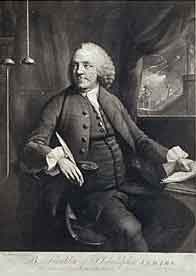
Benjamin Franklin (1706-1790) |
|
|